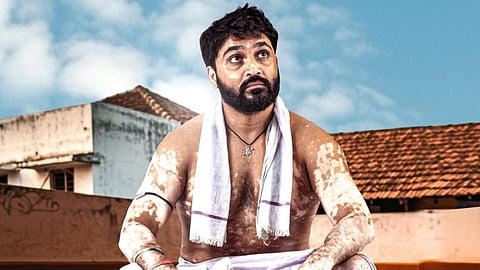Bilichukki Hallihakki Movie Review: A compelling journey from stigma to self-acceptance
Bilichukki Hallihakki Movie Review(3 / 5)
Cinema has long chased perfection. Heroes are chiselled, heroines glow, and flaws exist only to be corrected. Every now and then, a film appears that quietly challenges that lens. Bilichukki Hallihakki is one such film, a subtle rebellion by a man who carries his scars as truth rather than shame.
Mahesh Gowda, who writes, directs, produces, and stars in the film, builds the story around vitiligo, a condition he knows intimately. Yet the film never feels like an autobiography. It watches, waits, and lets life speak, asking the audience to look beyond skin without preaching. His skin becomes a starting point for conversation, not sympathy.
Shiva (Mahesh Gowda), is a man from a small village who has learned to move through a world that scrutinises him at every turn. Since childhood, he has faced whispers, uneasy glances, and quiet talks with his mother, Lakshmi Siddhaiah, about the white patches spreading on his skin. His strength lies in the ordinariness of his life. He laughs, hopes, adjusts, and carries on. That calm acceptance becomes his quiet defiance. Even under scrutiny, he moves with dignity, finding small moments of humour and hope.
Director: Mahesh Gowda
Cast: Mahesh Gowda, Kaajal Kunder, Jahangeer MS, Veena Sunder, Lakshmi Siddaiah, and Ravi Bhat
His life shifts when his family finds a match for him in Kavitha (Kaajal Kunder). To Shiva’s family, the alliance feels extraordinary. For Shiva, disbelief outweighs excitement. Why would someone considered flawless choose someone society views as blemished? That single question forms the emotional pulse of the film, simmering without ever being spelled out.
Early sequences are quietly provocative, like when the bride’s mother wonders aloud why a man with a limp is acceptable but vitiligo is not. These grounded moments reveal contradictions that sit uncomfortably close to the truth.
As Shiva and Kavitha begin their marital life, the story moves beyond romance to explore how they build a relationship. Kavitha defies her mother to marry Shiva, but acceptance does not come easily. Generations of superstition whisper in her ears that vitiligo is contagious, brings misfortune, or marks impurity. These myths, along with an emotional unease, test her genuine love for her husband, creating a tension Mahesh captures with quiet precision.
There is no melodrama. No shouting matches or teary monologues. Discomfort lives in gestures: Kavitha first hesitates when Shiva removes his shirt, the smiles she wears for others, the silences that lengthen between them. Shiva believes she is adjusting, but she carries fears he cannot see, which is kept as suspense. The film thrives in these unspoken spaces, letting subtlety carry the weight.
Mahesh Gowda delivers a performance that feels lived rather than acted. His pauses, half-smiles, his feelings, and the way he moves from half-sleeves to full-sleeves, even when he eventually bares his skin, says a lot. As someone portraying a condition he knows intimately, his dignity radiates through the frame. Kaajal Kunder, too, is quietly effective. She understands Kavitha deeply, and her internal conflict feels raw and honest, especially in moments where empathy and hesitation collide. Together, they create genuine chemistry built less on conversation and more on understanding.
Jahangeer as Ranganna brings in earthy humour, acting as a reminder of the old matchmaking mindset, practical, judgmental, yet oddly sincere. His lines about finding the right groom are both funny and revealing, showing how tradition continues to measure human worth. Veena Sunder, Lakshmi Siddaiah, and Ravi Bhat also make their presence felt, grounding the film in familiarity and warmth.
Technically, Bilichukki Hallihakki doesn’t aim for visual flamboyance. The cinematography is understated, with natural frames, and an unhurried pace that complements the film’s realism, and so is the film's compositions.
The title itself, meaning white spot, becomes a recurring metaphor. Like the moon’s craters that don’t diminish its glow, Bilichukki Hallihakki argues that imperfection is not the absence of beauty but proof of it.
Overall, Bilichukki Hallihakki becomes a reflection on quiet endurance, the strength of those who live with difference. The film isn’t flawless. Its pacing wavers in the middle, and a few supporting arcs feel incomplete. But its intention to humanise, not dramatise, remains intact. Its simplicity becomes its language, its silence becomes its protest.
In the larger context, Bilichukki Hallihakki is less about a man with vitiligo and more about a society that confuses normalcy with sameness. It questions how we perceive attraction, compassion, and purity. In a culture that often demands flawless heroes, Mahesh Gowda emerges as cinema’s brave man, wearing truth on his skin and courage in his storytelling.
Mahesh Gowda through his story in Bilichukki Hallihakki, doesn’t seek to move you through sentiment. He wants you to sit with the discomfort and re-examine the way you look at others. And in doing so, he makes the white spots of life glow with meaning.

